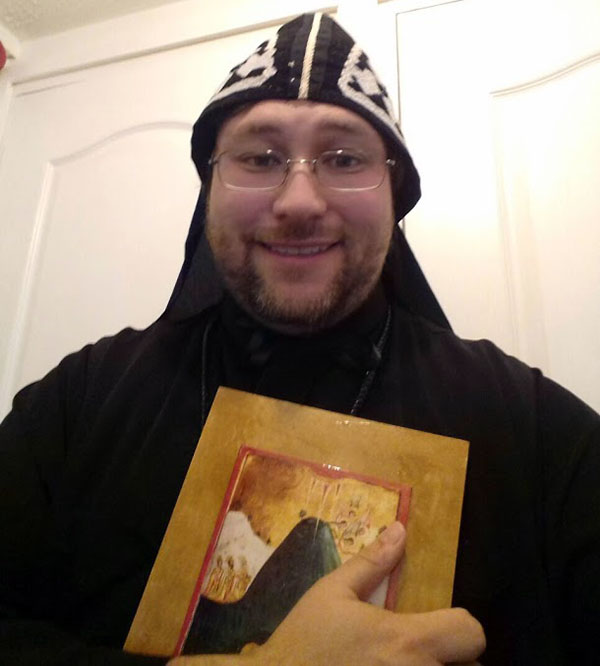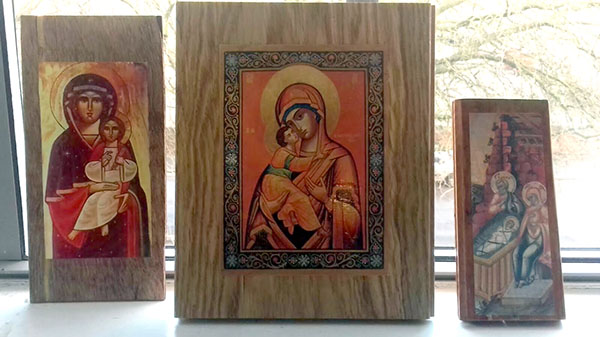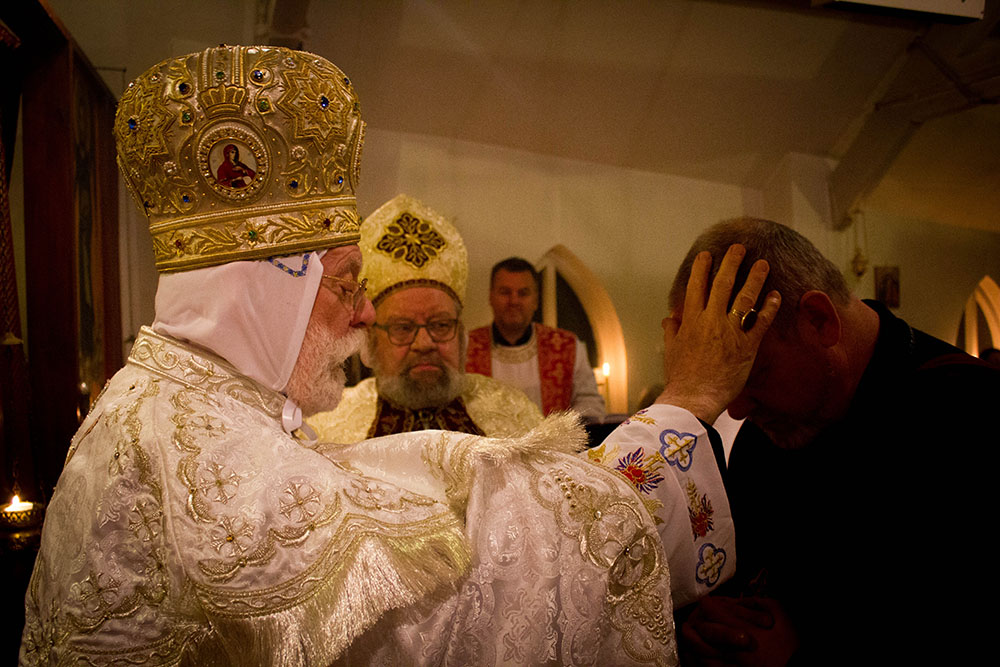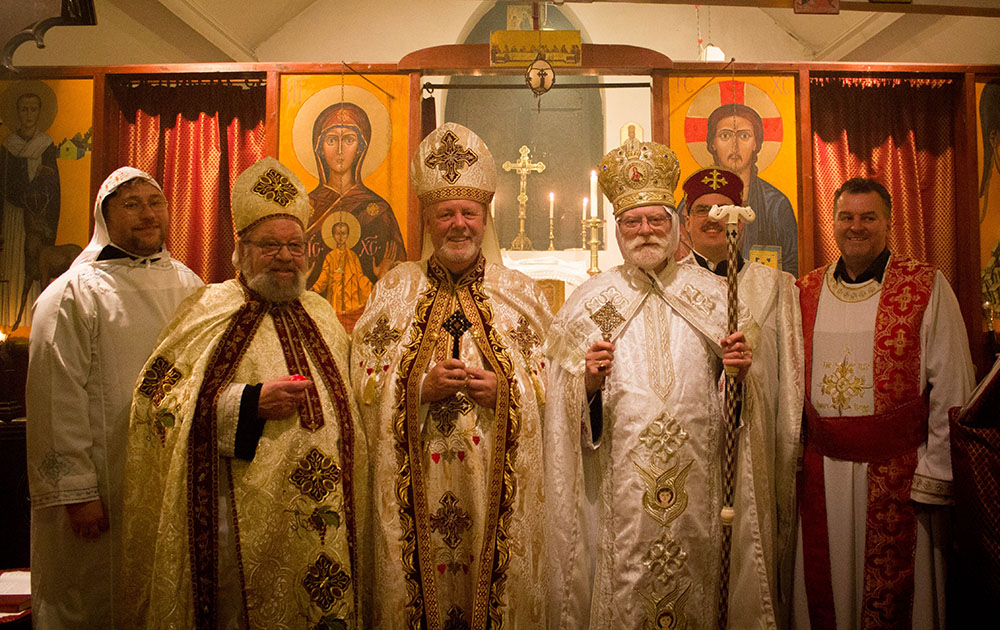Thanksgiving for Deacon Mark’s restoration to health
On Sunday, 7 May at St. Mary & St. Felix Church at Babingley, special prayers of thanksgiving were offered for the return to health of Deacon Mark Saunders, who was last at church on New Year’s Day, having suffered a period of poor health which had resulted in a long stay in various hospitals and rest homes. Deacon Mark drove himself to church and was warmly welcomed by the clergy and the congregation.
In his address, Abba Seraphim spoke of the various images of the Church: as a community and a family, but essentially as the Body of Christ and quoted the Apostle Paul, who said that if one part suffers, all the parts suffer with it; if one part is honoured, every part rejoices with it (I Corinthians XII: 26). During his physical absence Deacon Mark remained very much in the thoughts and prayers of the worshippers at Babingley, from which the Sacrament was carried to him; but equally from his sick bed he remained united in prayer with the worship at Babingley, as prayer transcends time and space and reaches out to God from our hearts. The church’s intercession for all manner and conditions of men encompasses the living and the departed, including the sick and those in various types of need. The respect and affection in which Deacon Mark is held meant that up and down the country and even abroad the prayers and good wishes of others were united with the worshippers at Babingley. Only that morning a message of greeting had been received from mainland China rejoicing in his return to church today.
As a practical man of action, whilst he may be frustrated by the restrictions which age and health now impose on him, his presence among us and his prayers are greatly cherished, “The effectual fervent prayer of a righteous man availeth much” (James V: 16).
In the Footsteps of St David and St Patrick
Father Antony Westwood of St. Petroc’s British Orthodox Mission in Torbay will be co-leading a small group of pilgrims on a five-day pilgrimage in Pembrokeshire, West Wales from May 23-27 the journey is titled ‘In the Footsteps of St David and St Patrick’ and will be based at St Non’s Retreat House near to St. Davids. Father Antony is a leader for the non-profit making organisation Journeying.co.uk, which started life in 1988 as ‘Pilgrim Adventure’ and leads small groups of people on pilgrimage to the more remote parts of Britain and Ireland, following in the footsteps of the early Celtic Saints.
As a Journeying leader and Orthodox Priest, Father Antony has discovered a deepened closeness to God through his travels to remote, liminal places and it is this ‘connecting on the edge’ that he wishes to share with others, and to this comes his ministry of the outdoors and his closeness to the early Saints of Britain and Ireland this in turn follows his deep appreciation of the Orthodox heritage of these islands maintaining two thousand years of tradition and life.
Father Alexis and the Holy Ikons

Father Alexis Raphael recently had a successful exhibition of wood-mounted ikon prints that he made at St Mary Magdalen’s Church, Bailgate, Lincoln. Originally scheduled from 24-31 March, it was extended until 6 April. The exhibition provided numerous opportunities for him to explain the spiritual significance of holy ikons, their place in Orthodox worship and other aspects of the Orthodox faith. On Saturday, 21 April, some of his icons were used at an ecumenical Taizé service in Lincoln and he has also been invited to give a talk about ikons to primary school children in Uphill Lincoln next month.

Holy Pascha at Cusworth

The traditional Holy Week services at the Church of St. Mark and St. Hubert, Cusworth Village, were led by Father David Seeds, assisted by Father Alexis Raphael, and well supported by the local congregation. On Paschal Eve, 15 April, the congregation was joined by Metropolitan Abba Seraphim, Archdeacon James and Subdeacon Athanasius, for the late night Vigil Service followed by the Divine Liturgy for Holy Pascha. During the service Abba Seraphim ordained Deacon Antony Westwood to the Sacred Order of the Priesthood to serve the newly formed British Orthodox Mission of St Petroc in Torbay, Devon.
In his homily, Abba Seraphim, commented on a recent ComRes poll which reported that one in four people who identify themselves as “Christians” in England believe that the physical resurrection of the Lord Jesus did not happen. Quoting St. Paul’s first epistle to the Corinthians (XV: 1-58) Abba Seraphim emphasised the centrality of the resurrection without which our faith would be in vain, and insisted that the death and resurrection, which we declared with our traditional salutation, “Christ is Risen !” underpinned the Christian faith. By way of affirmation the hearty singing of traditional paschal hymns rang our loudly from the crowded church and was audible throughout Cusworth village.

At the conclusion of the service, at which traditional foods from Cypriot, Latvian, Roumanian, Bulgarian and Russia Orthodox dishes joined with British foods in a fellowship buffet supper, which continued into the early hours of Holy Pascha morning.
Holy Saturday at St. Felix
On the morning of 15 April, Abba Seraphim celebrated the Holy Saturday Liturgy at St. Felix, Babingley, assisted by Archdeacon James and Subdeacon Athanasius Hall. He preached on the “Harrowing of Hell” to the congregation who had travelled from Holbeach, Wisbech, Burnham Norton and other surrounding villages in North Norfolk and Lincolnshire, before travelling to Fakenham to take the sacrament to Deacon Mark Saunders; who is convalescing from a period of ill health, which has led to him being in hospital for the past few weeks. During this period Deacon Mark has received regular visits from Abba Seraphim and other regular worshippers from St. Felix Church, as he has made a steady recovery to full health. To mark the Paschal Feast the outside of St. Felix has been newly repainted and offered a festive appearance in the Norfolk spring sun.
